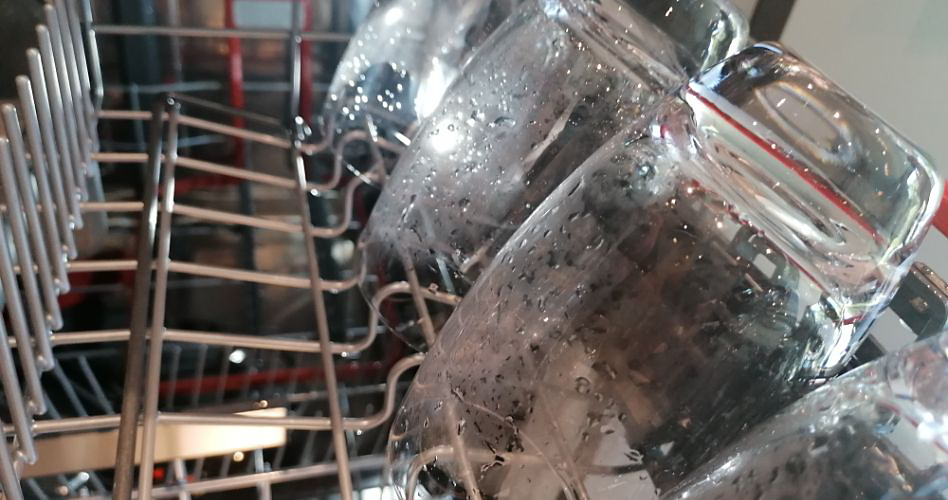Disclosure: This post contains affiliate links and I will be compensated if you make a purchase after clicking through my links. Learn More
Are you tired of unloading your dishwasher only to find your sparkling dishes coated in a mysterious white, gritty residue? You’re not alone.
This common issue can be both frustrating and puzzling, especially when you rely on your dishwasher to save time and effort. Imagine the relief of finally understanding why this happens and how you can easily fix it. We’ll dive into the reasons behind this annoying residue and share simple, effective solutions that will have your dishes gleaming again.
Stick with us, and soon, you’ll be eager to run your dishwasher without any worries!

Credit: www.reddit.com
Common Causes Of Residue
Finding white gritty residue on dishes can be frustrating. This residue ruins the sparkle of clean dishes and can be a sign of underlying issues. Understanding these causes can help solve the problem and restore your dishes’ shine.
Hard Water Effects
Hard water is a common culprit behind residue. It contains minerals like calcium and magnesium. These minerals can build up on dishes during the wash cycle. They mix with detergent and create a chalky residue. Using a rinse aid can help combat hard water effects.
Detergent Buildup
Using too much detergent leads to buildup. Excess detergent does not dissolve completely. It sticks to dishes and forms a gritty layer. Ensure you use the recommended amount for your dishwasher. Check your detergent type and consider using a different brand.
Improper Loading
Improper loading is another cause of residue. Overloading prevents water from reaching all areas. Dishes block water flow, leaving some spots unclean. Place items correctly and ensure nothing blocks the spray arms. This helps water reach every dish evenly.
Quick Fixes For Clean Dishes
Discover quick solutions for dishes plagued by white gritty residue from your dishwasher. Check water temperature and adjust detergent quantity. Regular cleaning of dishwasher filters and jets can also help.
Are your dishes coming out of the dishwasher with a stubborn white gritty residue? You’re not alone in this frustrating dilemma. Thankfully, there are simple adjustments you can make to ensure your dishes come out sparkling clean every time. Let’s dive into some quick fixes that can transform your dishwashing experience.
Adjusting Detergent Use
Have you ever thought that you might be using too much detergent? It’s a common mistake. More detergent doesn’t necessarily mean cleaner dishes. In fact, excess detergent can lead to residue buildup. Try using less detergent and see if your dishes come out cleaner.
Consider switching to a different brand or type of detergent. Some are specially formulated to prevent residue. Don’t forget to check the packaging for specific recommendations based on your dishwasher model.
Using Rinse Aid
Rinse aid can be a game-changer. It helps water slide off dishes more easily, preventing spots and residue. You might find it helpful if your water has high mineral content, which can exacerbate residue issues. Adding rinse aid is straightforward. There’s usually a compartment next to the detergent dispenser in your dishwasher. You fill it up, and it dispenses automatically during cycles. It’s a simple addition that can make a big difference.
Correct Loading Techniques
Are you cramming dishes into your dishwasher like a game of Tetris? This could be part of the problem. Proper loading ensures water and detergent reach all surfaces effectively. Space your dishes out so that each item gets maximum exposure to the spray arms. Large items should be on the sides or back, while smaller items can go on the top rack.
Avoid blocking the detergent dispenser and spray arms. Experiment with different loading patterns to see what works best for your dishwasher. Have you tried any of these fixes? What’s your go-to method for achieving spotless dishes? Share your thoughts and experiences—you might just help someone else solve their dishwashing woes!
Maintenance Tips
White gritty residue in dishwashers often results from hard water or improper detergent use. Regularly clean filters and spray arms to prevent buildup. Use a water softener or adjust detergent for better results.
Are you tired of unloading your dishwasher only to find white gritty residue clinging to your dishes? You’re not alone. Many people face this frustrating issue, but with a few simple maintenance tips, you can ensure your dishwasher runs smoothly and keeps your dishes spotless. Let’s dive into some practical steps you can take.
Cleaning The Dishwasher
Regular cleaning is essential to keep your dishwasher in top shape. Start by wiping down the door seals and interior walls with a damp cloth. This prevents grime build-up. Use a dishwasher-safe cleaner to run an empty cycle once a month. This helps break down any lingering food particles and removes odors. If you’re like me and occasionally forget this step, set a monthly reminder. A clean dishwasher means cleaner dishes.
Checking Water Softener
Hard water can leave mineral deposits on your dishes. If your area has hard water, consider installing a water softener. Check the salt levels in the built-in water softener, if your dishwasher has one. Refill it regularly to maintain its efficiency. Imagine the ease of having streak-free glasses without the need for extra polishing. A functioning water softener makes this possible.
Regular Filter Checks
Your dishwasher’s filter catches food particles and prevents them from redepositing on your dishes. Remove the filter, rinse it under warm water, and scrub away any stuck debris. Aim to do this at least once a month. A clean filter improves your dishwasher’s performance. Neglecting this simple step can lead to clogged filters and poor cleaning results.
Wouldn’t you rather spend a few minutes maintaining it than dealing with gritty residue? By focusing on these maintenance tasks, you’re not just caring for your dishwasher. You’re ensuring every meal ends with spotless plates and glasses. Isn’t that worth a bit of your time?
Preventative Measures
White gritty residue in your dishwasher can be annoying. Regularly cleaning the filter prevents this issue. Check water temperature to ensure it’s hot enough for effective cleaning. Using the right detergent and avoiding overloading can also help maintain your dishwasher’s performance, leaving dishes sparkling clean.
Preventative Measures to Stop White Gritty Residue in Your Dishwasher No one enjoys pulling out dishes covered in white, gritty residue after a dishwasher cycle. This common issue can be frustrating, but there are simple preventative measures you can take. By focusing on routine care, choosing the right products, and keeping an eye on water quality, you can enjoy sparkling clean dishes every time.
Routine Dishwasher Care
Keep your dishwasher in top shape with regular cleaning. Make it a habit to wipe down the door seals and remove any food particles from the drain. A monthly deep clean with vinegar or a dishwasher cleaner can prevent buildup and keep your machine running smoothly. Checking the spray arms is also important. Ensure they are free of debris and spinning correctly. This ensures water reaches all your dishes, reducing residue.
Choosing The Right Detergent
Not all detergents are created equal. Using the wrong type or amount can lead to residue on your dishes. Look for detergents that are compatible with your water type and dishwasher model. Consider experimenting with different brands if you notice residue. Sometimes, a switch in products can make all the difference.
Monitoring Water Quality
Hard water is often the culprit behind the white, gritty residue. Test your water to see if this is the issue in your home. If hard water is a problem, consider installing a water softener or using a rinse aid. These solutions can improve cleaning results by reducing mineral deposits. Is your dishwasher leaving residue despite your best efforts? It might be time to call a professional for an inspection.
Regular maintenance can help catch issues early and save you from future headaches. By taking these preventative measures, you can ensure your dishwasher performs at its best. Your dishes will thank you with a sparkling clean shine, and you’ll save time and effort scrubbing them by hand. What changes will you make today to improve your dishwasher’s performance?
When To Call A Professional
Experiencing white gritty residue from your dishwasher? It might be time to call a professional. Persistent residue can indicate a deeper issue, requiring expert diagnosis and repair for optimal performance.
When your dishwasher leaves a white, gritty residue, frustration builds. You scrub dishes again, wasting time and water. Sometimes, the issue needs more than a DIY fix. Knowing when to call a professional can save you from future headaches.
Identifying Persistent Issues
If the residue returns after several troubleshooting attempts, it’s a red flag. Common DIY fixes fail, then expert eyes and hands might help. Professionals can diagnose hidden problems that you might miss. They have specialized tools and experience to spot intricate issues. Continual residue means something deeper might be wrong.
Assessing Appliance Age
Older dishwashers often struggle more than newer models. Over time, parts wear down, causing performance to decline. If your appliance is over ten years old, repairs might be frequent. Professionals can assess whether repairs are worth it. They might suggest if a replacement is more cost-effective.
Evaluating Repair Costs
Repair costs should be weighed against replacement expenses. A professional can provide a clear estimate. Sometimes, minor repairs solve the problem without breaking the bank. Other times, a new dishwasher might be cheaper long-term. Experts can guide you in making a smart financial decision.

Credit: www.whirlpool.ca

Credit: www.kitchenaid.ca
Frequently Asked Questions
Why Does My Dishwasher Leave White Residue?
White residue often comes from hard water. Minerals like calcium and magnesium cause gritty deposits.
How Can I Prevent Gritty Residue In My Dishwasher?
Use a rinse aid or water softener. They help reduce mineral deposits and improve cleaning.
Is Vinegar Effective For Removing Dishwasher Residue?
Yes, vinegar helps. Run an empty cycle with a cup of vinegar. It clears mineral buildup.
Are Certain Detergents Better For Hard Water Issues?
Yes, some detergents are designed for hard water. Look for labels like “hard water formula. “
Final Words
Solving the white gritty residue problem is simple. Start by checking your dishwasher’s settings. Use the right detergent and maintain proper water temperature. Regularly clean your dishwasher to prevent buildup. Check for clogged spray arms and filters. Use rinse aid for better results.
Hard water can be a culprit, so consider a softener. Following these steps can improve cleaning results. No more white residue on your dishes. Enjoy sparkling clean dishes every time! Keep your dishwasher in top condition for the best performance.
Happy dishwashing!


